Publications
For submission of articles or Working Papers to CEsA, please send an email to:
comunicacao@cesa.iseg.ulisboa.pt
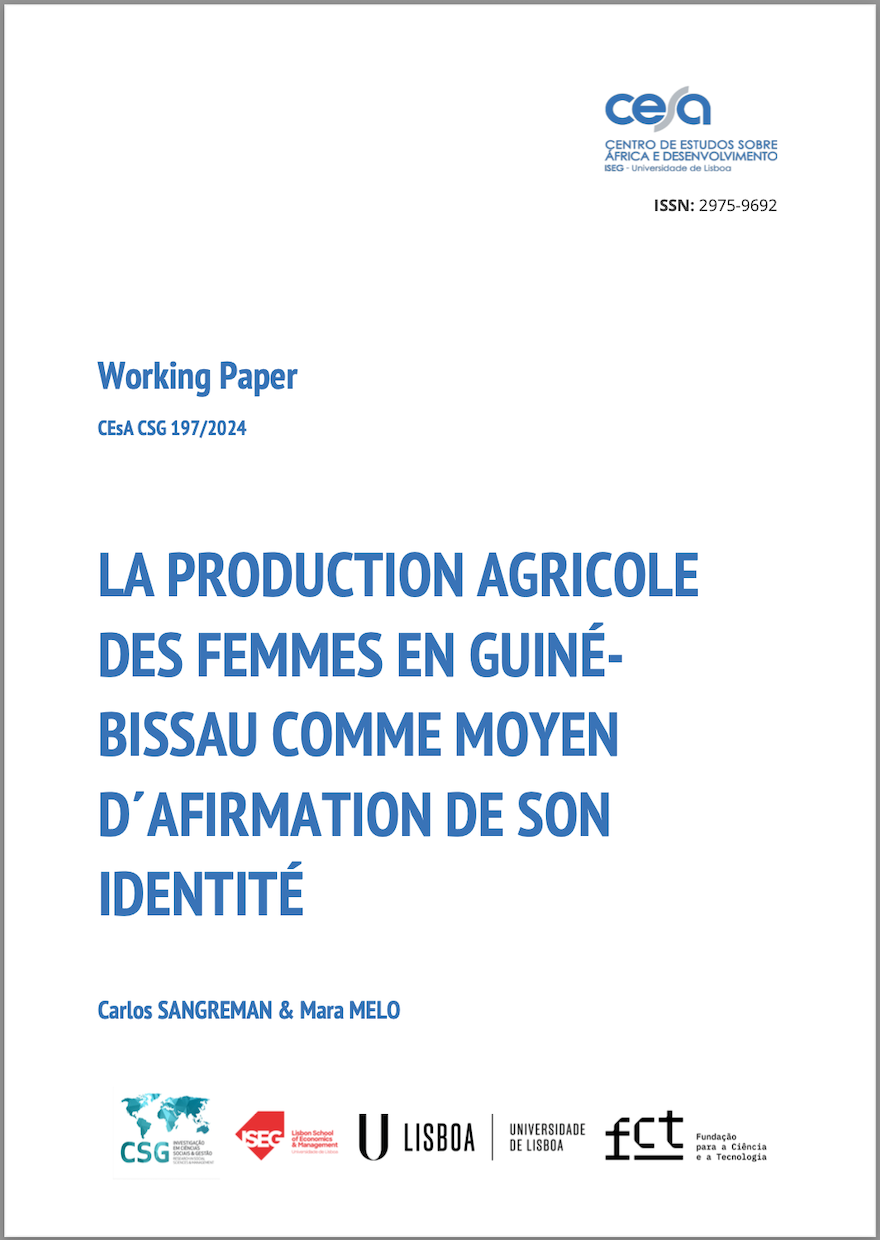
Working Paper 197/2024: La Production Agricole des Femmes en Guiné-Bissau comme Moyen d´Afirmation de son Identité
Abstract:
This working paper is an intermediate product of the study done for Swiss Cooperation in Guinea-Bissau, written in French without any point in Portuguese. What we demonstrate, as well as the principles of restitution and appropriation by the persons or institutions that access to respond to surveys or interviews, are words that do not translate into concrete actions for this Cooperation. The data were obtained by surveys and interviews in the regions of Bissau, Biombo, Bafatá, and Oio, with the producers (which also include a limited number of male producers) of leguminous agricultural products, in a sample of 160 people chosen at random. At the option of the promoter, the study focused on the marketing of products and not on production. To better understand the results, it must be said that this business model is not very profitable, but it is an activity that gives a greater independence of women in relation to men in the family space, since decisions about the use of profits belong to the producers. It also has a potential environment of action for the affirmation of the social (and not just family) identity of women that should not be despised although, as far as we can see, this is expressed for now only in the organization of associations of producers.
Cite this Working Paper:
Sangreman, C. e Melo, M. (2024). “La Production Agricole Des Femmes En Guiné-Bissau Comme Moyen D´Afirmation De Son Identité”. Instituto Superior de Economia e Gestão – CEsA/CGS – Documentos de trabalho nº 197/2024
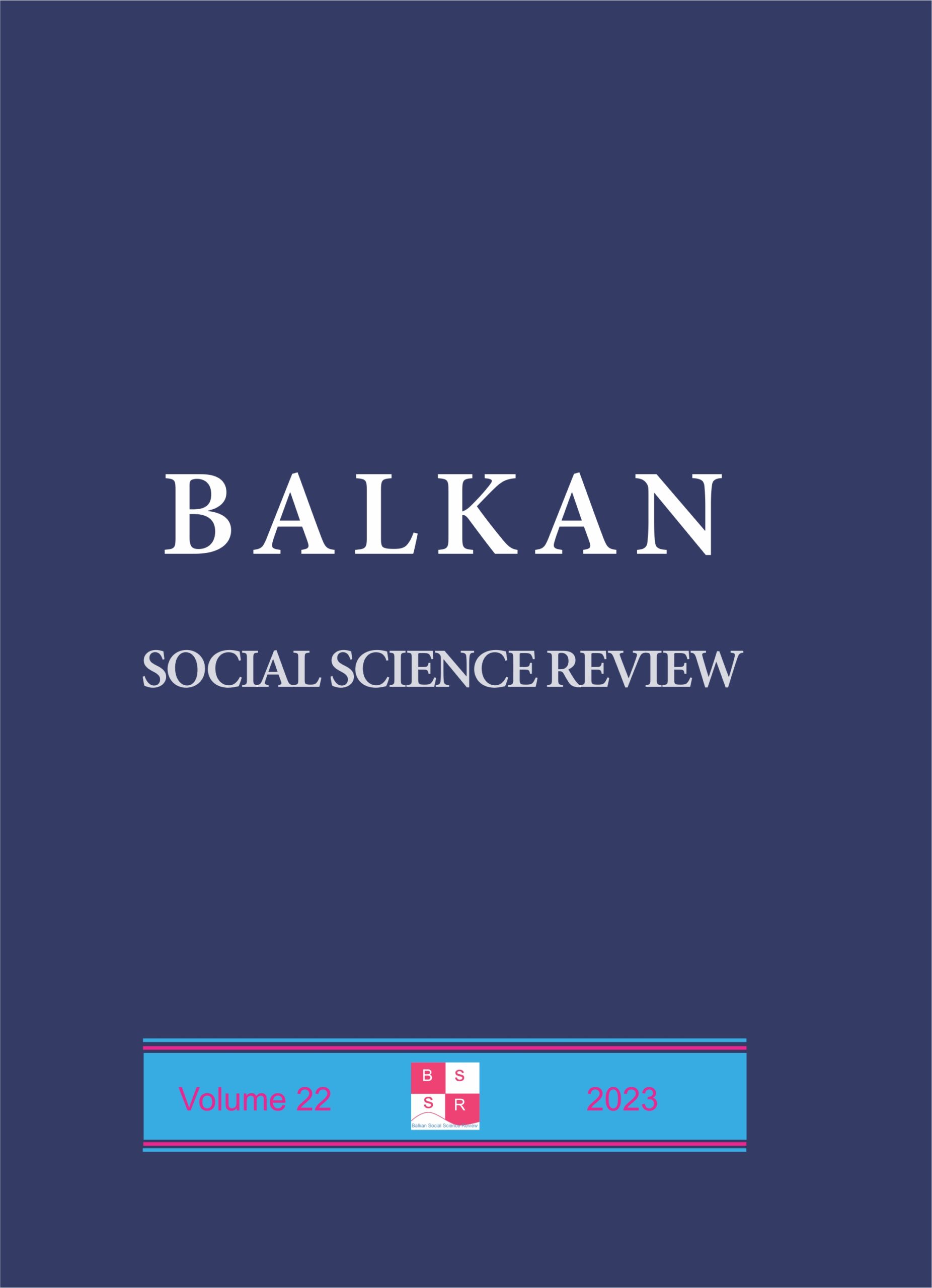
Understanding Social Realities of Internally Displaced Persons (IDPs) in the Federal Capital Territory of Nigeria (FCT), Abuja
Abstract:
This article examines the social realities of forcibly displaced persons in Nigeria, with a focus on internally displaced persons (IDPs) in the Federal Capital Territory (FCT) of Nigeria, Abuja. Internally displaced persons are individuals who have been forced from their homes or habitual places of residence and, unlike refugees, have not crossed the borders of their country. They remain under the primary protection of their governments and often seek refuge in their own countries. This study draws on secondary data sources and primary data collected from two IDPs campsites, arguing that most IDPs in the FCT, displaced by the Boko Haram insurgency live in makeshift and inhumane informal settlements in the peri-urban areas of Abuja City. These settlements also host the urban poor and other economic migrants in the country’s capital, occasionally leading to conflicts between them. The paper calls for the government to recognise the presence and condition of IDPs in the FCT and to work with relevant organisations to provide durable solutions to ensure that displaced persons can once again become productive members of society.
Cite this article:
BA-ANA-ITENEBE, C. A.; EDO, Z. O. (2023). Understanding Social Realities of Internally Displaced Persons (IDPs) in the Federal Capital Territory of Nigeria (FCT), Abuja. In: Balkan Social Science Review, Vol. 22, 213-231. https://doi.org/10.46763/BSSR232222213bai
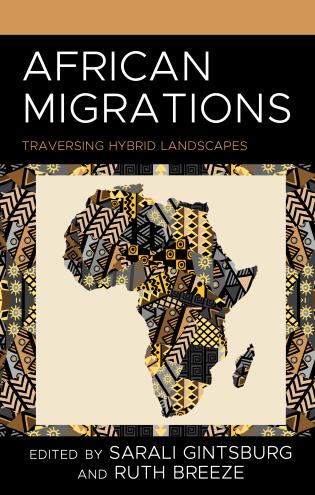
From Angola to Portugal: Narrating Migration, Memory and Identity in Djaimilia Pereira de Almeida’s Work
Abstract:
Based on the teoretichal perspetives of Lusophone Postcolonial Studies, in dialogue with other analytic tools from Feminist Studies, this chapter aims to explore the topics of migration, memory and identity through the close reading of two works of fiction by the Portuguese writer of African descent Djaimilia Pereira de Almeida (1982), who was born in Angola and grew up in Portugal. In the autofiction That Hair (Tin House, 2020; originally published in Portuguese as Esse Cabelo, 2015), as well as in the novel Lisbon, Luanda, Paradise (Lisboa, Luanda, Paraíso, 2018), the main characters move from Angola to Portugal for personal or family reasons and seek to redefine their identities. They give voice to memories and narratives that involve the relationships between the colonial past and the building of contemporary postcolonial identities. In particular, the chapter analyses the representation of both the place of orign and arrival to portray the complex socio-cultural and migratory identity landscapes that emerged during Portuguese colonialism, as well as following the decolonization in Lusophone Africa (1975). In this regard, incluiding also a brief reading of the most recent novel by Almeida, Maremoto (2018), the chapter pays special attention to the perceptions and experiences of the city of Lisbon by narrators and protagonists who are immigrants, in order to reflect on the contemporary configurations of a postcolonial city on the periphery of Europe.
Citation:
Falconi, Jessica (2024) “From Angola to Portugal: Narrating Migration, Memory and Identity in Djaimilia Pereira de Almeida’s Work” in S. Gintsburg & R. Breeze (eds) Afriacan Migration: Traversing Hybrid Landscapes. Lanham: Lexington Books, p. 15-35.
https://rowman.com/ISBN/9781666938708/African-Migrations-Traversing-Hybrid-Landscapes
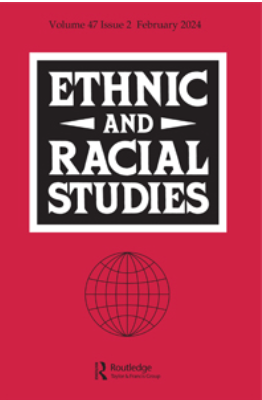
African women’s trajectories and the Casa dos Estudantes do Império, Ethnic and Racial Studies
Abstract:
This article compares the trajectories of different women who crossed the Casa dos Estudantes do Império (CEI), a formal institution created in Lisbon by students from the colonies with the support of the Portuguese dictatorial regime in 1944, that became a platform for anti–colonialism. Due to the role played by the CEI in the political and social paths of the leaders of African national liberation movements, historiography has privileged masculine accounts. In contrast, the roles and lives of women linked to the CEI remain unexplored or approached from a vision of “methodological nationalism”, with few exceptions. Addressing these trajectories from a transnational and “Afro–Iberian” lens and through the scrutiny of several sources allows us to reflect on a diversity of gender, race, class, and political ideology. The final aim is to illuminate some aspects of the Afro–Iberian mosaic from a gendered and postcolonial perspective.
Citation:
Jessica Falconi (2023) African women’s trajectories and the Casa dos Estudantes do Império, Ethnic and Racial Studies, DOI: 10.1080/01419870.2023.2289141
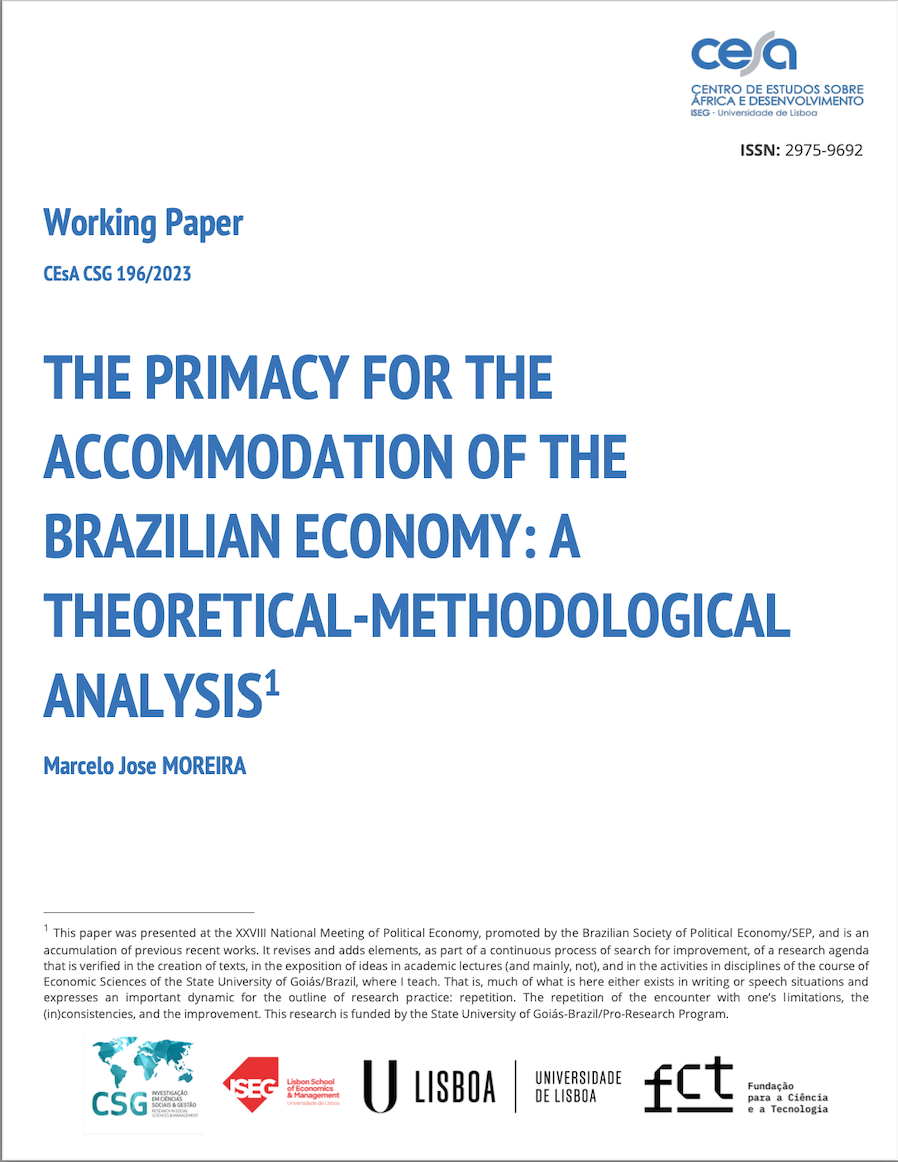
Working Paper 196/2023: The Primacy for the Accommodation of the Brazilian Economy: A Theoretical-Methodological Analysis
Abstract:
The capitalist economy is immersed in generalized inertia. A movement of slow accumulation, low investment, limited growth rates, but with a high level of profit, and which is due to intense pressure on the levels of existing inequalities, combining worldwide restructuring of the generation of wealth and income to a pattern of reproduction of the labor force at the level of its limited maintenance. This inertia occurs, above all, from the financial-productive crisis of the first decade of the 2000s. Brazil is no stranger to this inertia and its developments. Therefore, this paper intends, from a conceptual reflection, to analyze the national economic conjuncture, from what I call the structure and primacy for the accommodation of the Brazilian economy.
Cite this Working Paper:
Moreira, Marcelo Jose (2023). “The Primacy for the Accommodation of the Brazilian Economy: A Theoretical-Methodological Analysis”. CEsA/CGS – Documentos de trabalho nº 196/2023
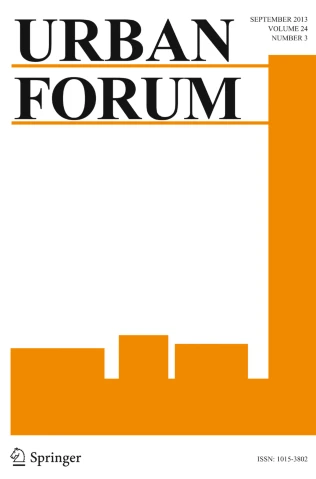
Armed Conflict and Urbanization in Cabo Delgado, Mozambique: A methodology for a critical inquiry
Abstract:
Mainstream urban theory fails to encompass urbanization in Africa. Among its many drivers, armed conflicts displace rural populations to cities, accelerating urban processes and impacting sustainability and governance — the phenomenon of conflict-induced urbanization. In the province of Cabo Delgado, a violent insurgency has been displacing thousands of civilians since 2017; many of whom have fled to the provincial capital Pemba, doubling its population in just 5 years. This article presents the theoretical framework and methodological design for an inquiry located within a contemporary critique of mainstream urban studies; the goal is to analyse conflict-induced urbanization in Pemba with a comparative case study, using participatory visual methods, for which a pilot study took place in September 2022. With this, the author aims to contribute to engaged urban studies in Mozambique and Portugal and to transform the trauma of war into opportunities for sustainable development and prosperity.
Cite this article:
Agostinho do Amaral, S. Armed Conflict and Urbanization in Cabo Delgado, Mozambique: A Methodology for a Critical Inquiry. Urban Forum (2023). https://doi.org/10.1007/s12132-023-09505-y

Os Ismailis Lusófonos, os Aga Khan e Portugal: mais de um século de história (Sec xix-xxi)
Abstract:
The commemoration of the 60th anniversary of the rise to the Imamate of Aga Khan IV, His Highness Prince Karim al Husseini, is a moment of particular significance for Ismailis worldwide, especially for those living in Portugal and Spain. While it is important to underline the recent and highly significant developments with regards to the relations between the current Imam and the Portuguese state, much can be gained from providing an historical perspective on this matter. This paper aims to contribute to such endeavour, by analysing both the stablishment of ties between Aga Khans III and IV and the Portuguese Empire on both sides of the Indian Ocean, as well as by examining the history of the Ismaili community then installed in Mozambique.
Quotation:
Nicole Khouri y Joana Pereira Leite, «Os Ismailis Lusófonos, os Aga Khan e Portugal: mais de um século de história (Sec xix-xxi)», Mélanges de la Casa de Velázquez [En línea], 53-2 | 2023, Publicado el 24 noviembre 2023, consultado el 07 diciembre 2023. URL: http://journals.openedition.org/mcv/20283; DOI: https://doi.org/10.4000/mcv.20283
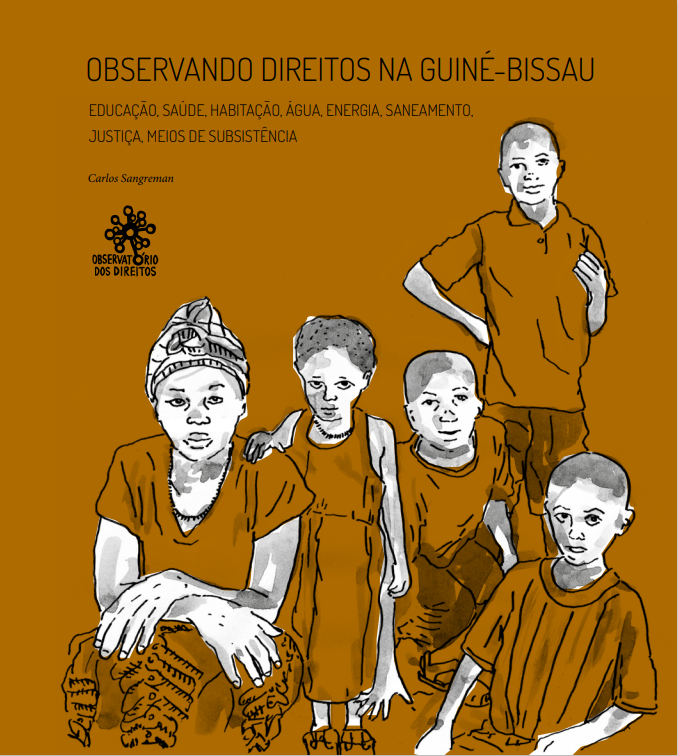
Observando Direitos na Guiné-Bissau: Educação, saúde, habitação, água, energia, saneamento, justiça, meios de subsistência
Quotation:
Sangreman, C. (2017). Observando Direitos na Guiné-Bissau – educação, saúde, habitação, água, energia, saneamento, justiça, meios de subsistência. Lisboa: ACEP, com LGDH e CEsA. ISBN 978-989-8625-16-8

Observando Direitos na Guiné-Bissau: Educação, saúde, habitação, água, energia, saneamento, justiça, meios de subsistência
Quotation:
Sangreman, C. (2016). Observando Direitos na Guiné-Bissau – educação, saúde, habitação, água, energia, saneamento, justiça, meios de subsistência. Lisboa: ACEP, com LGDH e CEsA. ISBN 978-989-8625-14-4
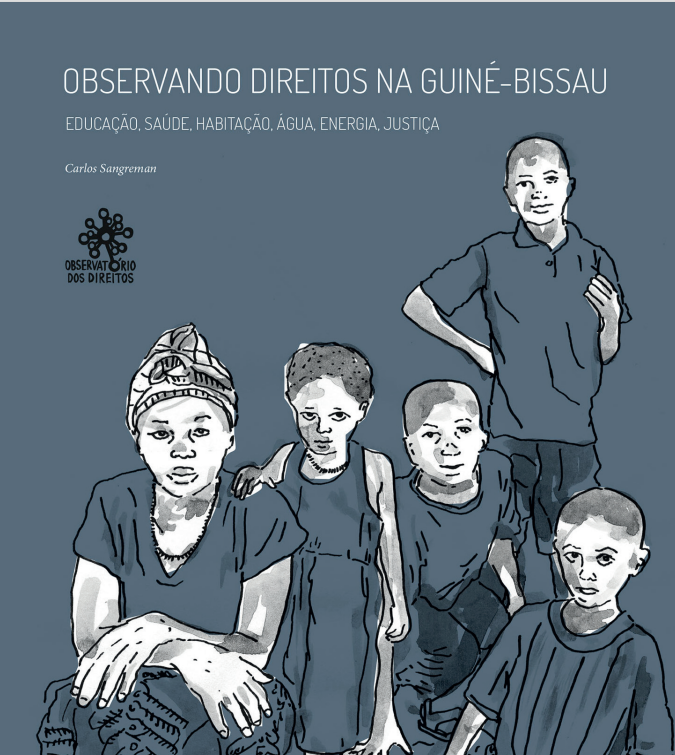
Observando Direitos na Guiné-Bissau: Educação, saúde, habitação, água, energia, justiça
Quotation:
Sangreman, C. (2015). Observando Direitos na Guiné-Bissau – educação, saúde, habitação, água, energia, justiça. Lisboa: ACEP, com LGDH e CEsA. ISBN 978-989-8625-07-6.





